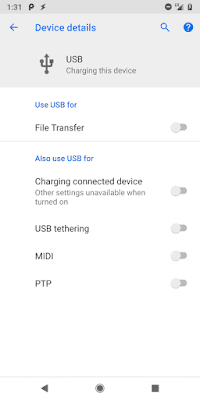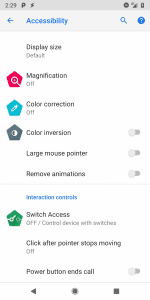Android 9.0 is here. The most awaited Android P first developer preview is out now. As expected there are many key changes to the UI and core functionality of Android. The developer preview is released for Google Pixel, Google Pixel Xl, Google Pixel 2 and Google Pixel 2 XL. Also, do mind that this is just a preview of how the Android P will work. Many features could be added later and some of the existing features could be removed.
The Download links for the mentioned devices are provided at the bottom of this post. Also flashing instructions will be added soon.
Let’s get directly into the topic. This is gonna be a long post, so go grab your popcorn. These are the new things noticed in the first developer preview of Android 9.0.
Support for Notch:
Notification Style:
The notifications have a new flat style theme and showing full conversations including pictures and stickers. Smart replies are also available. To hide notification from a specific app you no longer needed to jump into settings just long press on the ongoing notification then you will see options “Stop Notifications” and “Keep Showing”.UI Changes:
The Screenshot option is now added to the Power Menu options. Besides, the Screenshot option now also supports native screenshot, basic editor.
The USB Setting page also got a redesign.
The Volume slider is now shrunk and aligned to right side of the screen. By default, the volume control will now change only the Media Volume. The Ringer volume can be changed by tapping the arrow icon. The call volumes can be changed only in calls. The Calls / Ring option in the volume slider can be tapped to change between Ring, Silent and Vibrate.
Pixel launcher now has a light shade to the dock. The search bar also has a microphone icon for voice search.
No More Orange warning bars:
One of the ugly design in Android is the Status Bar and Navigation bar changing to Orange color when Battery Saver is enabled. Android P no longer shows Orange bar and also now you can set exactly with a slider when you want to enable battery saver. Previously it can be set at 5%, 10% and 15% of battery remaining.Adaptive brightness now changes base brightness:
This is also one of the worst change Android made. Every time you step out you need to increase the base brightness of the screen to see in sunlight. Android P now changes the base brightness when set to adaptive brightness so no need to manually change the brightness again while going out just like old times.Improved Privacy and Battery life:
Android P does not allow apps which are in idle to access Camera, Microphone or any of the hardware features ensuring that they can’t track or access without user’s consent.
Also, the giant is working on improving the battery efficiency of Android by tweaking the already existing features like Doze, Stand-by and background limits. We can expect the new operating system would be lighter on battery.
 Google Maps:
Google Maps:
Always On Display:
The Always on Display now shows Battery Info and device charging status. The notifications are now centered and a divider is there between time and notifications.
Easter egg and About Phone:
Of course, there is a new Easter egg in the settings and is not the final one as the name is not yet revealed. The About Phone page also got a little redesign. Some items on tap show information in the pop up window.Text Selector Zoom:
While doing back and fro in the text using the text selector obviously you can’t see which letter you have chosen as your finger hides the text. Now it will zoom in and show the text you are scrolling for better viewing.Do Not Disturb Modification:
Do not disturb option in quick settings now only show the duration of the activity rather than showing all the three modes Total Silence, Alarms Only, and Priority Only. Also, there is only one single mode which you can customize in the settings.
Hotspot automatically turning off:
Now Hotspot will automatically turn off when no device is connected and the hotspot is not actively used. This will make sure that the device battery isn’t drained out by without being used.
Rotation Lock:
Though this feature is widely used in most Custom ROMs and other manufacturers, Google now only added the feature natively. In previous versions, the rotation only locks in portrait mode now it can even be locked in landscape mode. All you need to do is rotate the device to landscape and turn off autorotation.Multi Bluetooth Support:
Now you can connect up to 5 Bluetooth Hands-free or A2DP devices at the same time. This does not mean that you can stream to all the devices at the same time but you can switch between connections seamlessly without disconnecting and reconnecting again. This can be enabled in developer options in the settings.
Wi-Fi Metered Connections:
Vibration Controls and Animations:
This feature allows you to easily set vibrations for the call, ring, and touch in the new accessibility setting. Additionally, you can even set the vibration duration to low, medium and high.
There is a change in transition animations between Apps, Settings page, and also in the launching of an app from Notifications. Besides you can easily turn them off in the Accessibility settings. Previously you need to go into the developer options to turn off animations.
Notification History:
Android always keeps track of notifications in the notifications log but are not hidden from the users. (Although can be accessed by using a Notification logger app) Now with Android P, you can see at least a bunch of previous notifications in the notification settings. However, you can’t see the notification content.For Developers:
- Support for more video and image codecs such as HDR VP9 Profile 2 and HEIF.
- A warning message will show when installing an app meant for lower Android Versions earlier than 4.2 to make developers to adapt to latest SDK version.
- Multi-Camera API so that camera can access more than one image sensor at a time.
- ImageDecoder for Bitmap and drawables for decoding images.
- Neural Networks API version 1.1.Improved performance for Android RunTime (ART) and apps are written on Kotlin.
- Unified Fingerprint Authentication Dialog.
- Client Side Encryption for Android Data Backup. Now requires Password, PIN or Pattern to be entered in order to restore a backup.
- OpenMobile API (OMAPI) for NFC payments and secure transactions.
- SysTrace in Quick settings.























No comments:
Post a Comment